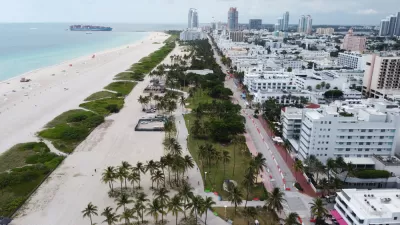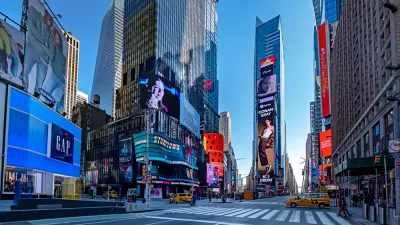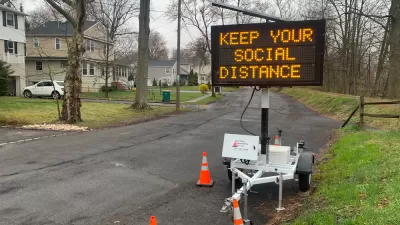The short-term environmental effects of the pandemic economic downturn are clear in the amount of carbon emissions that have been removed from the economy. The long-term effects, however, are subject to a number of contingencies.

The Rhodium Group has repackaged its annual assessment of U.S. greenhouse gas emissions to focus on the largest source of uncertainty in the current outlook for the country's emissions: COVID-19's impact on the economy.
It has been over 100 years since the US has confronted a pandemic of this magnitude, so there are few historical precedents for understanding what to expect over the coming years. There are four main components of uncertainty: 1) the epidemiological outcomes of COVID-19 and its spread; 2) how states, companies, and communities respond to the epidemiological risks through lockdowns or restrictions on activity; 3) the resulting impact to the US economy; and 4) the response of federal and state governments to shore up the economy through stimulus and recovery measures.
The report explores scenarios for the first three of those components, and promises a future report to include scenarios for the fourth.
Included in the key findings included in the report, Rhodium Group reports an 18% decline in emissions from March 15 to June 15 in 2020 compared to the previous year. "We find the potential for a persistent effect on GHG emission trends—with reductions of 6-12% this year relative to pre-COVID projections, and 2-12% by 2030, depending on the depth and duration of the crisis and the pace of recovery (a V, W, or L-shaped recovery)," reads the report.
Those emission reductions have come at tremendous cost, however, as a reflection of the economic downturn that the world is suffering as a consequence of the pandemic. "Near-term emission reductions driven by COVID-19 also come at an enormous economic cost—$3,200-5,400 per ton of CO2 reduced, on average this year," according to the report.
The report also includes information about how it's possible for clean energy and climate investments to lead the economic recovery and lower carbon emissions, without the terrible economic costs that have precipitated these trends in 2020.
FULL STORY: Taking Stock 2020: The COVID-19 Edition

Alabama: Trump Terminates Settlements for Black Communities Harmed By Raw Sewage
Trump deemed the landmark civil rights agreement “illegal DEI and environmental justice policy.”

Planetizen Federal Action Tracker
A weekly monitor of how Trump’s orders and actions are impacting planners and planning in America.

The 120 Year Old Tiny Home Villages That Sheltered San Francisco’s Earthquake Refugees
More than a century ago, San Francisco mobilized to house thousands of residents displaced by the 1906 earthquake. Could their strategy offer a model for the present?

In Both Crashes and Crime, Public Transportation is Far Safer than Driving
Contrary to popular assumptions, public transportation has far lower crash and crime rates than automobile travel. For safer communities, improve and encourage transit travel.

Report: Zoning Reforms Should Complement Nashville’s Ambitious Transit Plan
Without reform, restrictive zoning codes will limit the impact of the city’s planned transit expansion and could exclude some of the residents who depend on transit the most.

Judge Orders Release of Frozen IRA, IIJA Funding
The decision is a victory for environmental groups who charged that freezing funds for critical infrastructure and disaster response programs caused “real and irreparable harm” to communities.
Urban Design for Planners 1: Software Tools
This six-course series explores essential urban design concepts using open source software and equips planners with the tools they need to participate fully in the urban design process.
Planning for Universal Design
Learn the tools for implementing Universal Design in planning regulations.
Clanton & Associates, Inc.
Jessamine County Fiscal Court
Institute for Housing and Urban Development Studies (IHS)
City of Grandview
Harvard GSD Executive Education
Toledo-Lucas County Plan Commissions
Salt Lake City
NYU Wagner Graduate School of Public Service





























